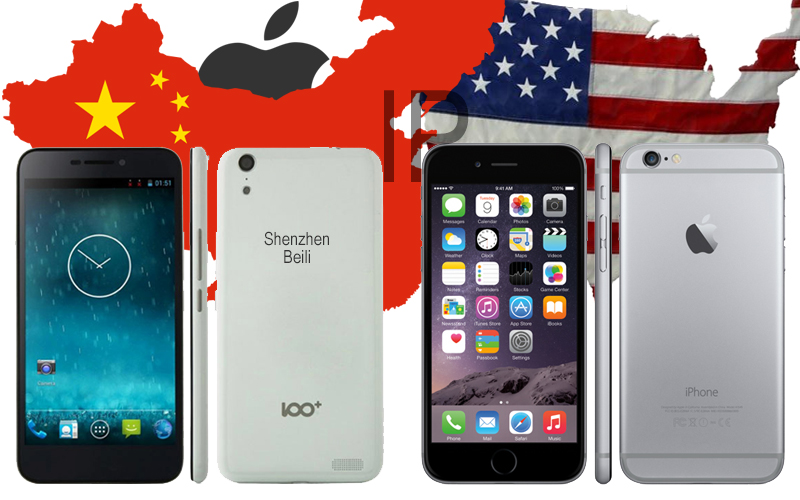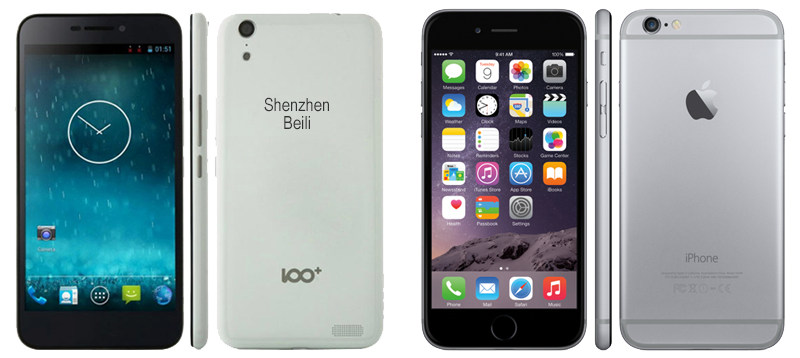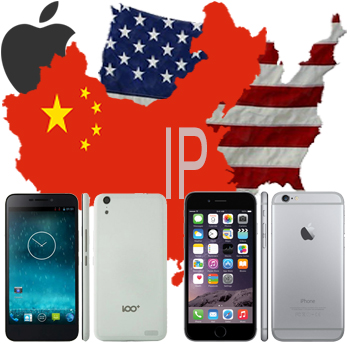Apple iPhones Still Available in China, However..?!

Apple Inc said its iPhone 6 and 6 Plus were still available for sale in China after Beijing's intellectual property regulators barred their sales saying the designs had infringed a patent held by a Chinese company.
A Beijing court ordered Apple to stop selling the iPhone 6 and 6 Plus in the city, having ruled that the phone’s design looked too much like the 100C model made by Shenzhen Beili, a small Chinese brand.
The ruling by an intellectual property tribunal is the latest legal stumbling block for Apple in its second-biggest global market following the suspension of its iTunes movie service in April.
The company also faces rising competition from local brands including Huawei and Xiaomi, which have gained market share.
“We appealed an administrative order from a regional patent tribunal in Beijing last month and as a result the order has been stayed pending review by the Beijing IP Court,” Apple said in a statement on Friday.
The notice, dated May 19, banning sales of certain iPhone models in Beijing was posted on a Chinese government website.
The Chinese market is vital to Apple, driving more of its sales than any other region outside the United States. But the tech giant has faced greater scrutiny there in recent months, with its online book and film services blocked by Chinese regulators earlier this year.
Apple historically had enjoyed favorable treatment in China, but Beijing’s crackdown on the iPhone 6 and 6 Plus is a reminder that the tech giant is not immune to the scrutiny that other U.S. tech firms have long faced in the country, said analyst Colin Gillis of BGC Partners.
“There’s a variety of risks of having dependence on sales in China to Apple, and government intervention in whatever form is one of them,” he said.
Last month, Apple announced that it would invest $1 billion in Chinese ride-hailing firm Didi Chuxing, a move that was widely viewed as an attempt to shore up relations in China.
Source: Reuters
Apple’s Loss in Chinese Patent Fight Seen Emboldening Rivals
As reported by Bloomberg, Apple Inc.’s loss in a Chinese patent dispute may spell more legal trouble ahead as fast-rising local rivals get bolder in taking on the world’s largest technology company.
The Beijing Intellectual Property Office ruled last week that some Apple devices violate the design patents of little-known Chinese smartphone vendor Shenzhen Baili. While the iPhone maker appealed to keep its best-selling gadgets on the market, it could face a rising tide of lawsuits and a threat to its sales if the ruling creates a precedent, according to Counterpoint Research.
The ruling is the latest headache for Apple in China, where it already faces aggressive rivals and a slowing economy in its biggest market outside the U.S. The nation’s patent and intellectual property laws are murky and courts have already ruled against the company over the name of iconic products such as the iPhone.
Spot the Difference

The iPhone 6 and iPhone 6 Plus infringe on Shenzhen Baili’s patent rights because of similarities to its 100C phone, the Beijing Intellectual Property Office wrote in its decision - Can you ‘spot the difference?’
Baili is just one of scores of smartphone brands trying to cash in on the country’s mobile boom. Legitimate lawsuits are on the rise as Chinese companies build up their intellectual property through research and development, said James Yan, Beijing-based research director at Counterpoint. Apple should sell about two to three million units of the iPhone 6 and iPhone 6 Plus in each of the second and third quarters in China, about 30 percent of overall sales, Counterpoint estimates.
“Chinese makers have been building their own IP pools over the past years and are able to somehow fight against industry giants,” he said. “Apple isn’t willing to publicly lose an IP case in China and the best option for them is to offer settlement fees.”
Xiaomi Corp. and Huawei Technologies Co. are among those that have bulked up their patent portfolios, through deals with foreign companies, acquisitions or intense research. Beijing-based Xiaomi alone applied for more than 3,700 patents in 2015 and this month struck a deal for nearly 1,500 patents with Microsoft Corp. In May, Huawei filed a patent lawsuit against Samsung Electronics Co. in the U.S. and China.
Apple representatives in China didn’t respond to multiple e-mails seeking comment and phone calls were directed to voice-mail. Kristin Huguet, an Apple spokeswoman, last week said the company had appealed the ruling and its products are available for sale in China.
Stinging Defeat
The defeat is striking also because Apple aggressively defends its technology patents, most notably in a series of lawsuits across four continents against arch-foe Samsung. The iPhone in particular is credited with pioneering the modern smartphone revolution.
It’s another sign that Chinese officials are scrutinizing the company more closely and comes as Apple - already trying to reverse a slowdown in iPhone sales - prepares to roll out the next version of its iconic device.
China shut Apple’s book and movie service in April for violating foreign publishing regulations, and last month a Beijing court ruled that a little-known accessories maker could use the iPhone label for a range of wallets and purses. In 2012, Apple paid $60 million to Proview International Holdings Ltd. to settle a dispute over the right to the iPad name. And billionaire Carl Icahn said in April he unloaded his position in the company because of concerns about its relationship with China.
In the face of such obstacles, Apple has made efforts to remain on good terms with the Chinese government, including a visit by Chief Executive Officer Tim Cook in May that coincided with a $1 billion investment in the country’s biggest car-sharing service, Didi Chuxing Technology Co. In 2013, Cook apologized after state media accused Apple of shoddy customer service and inadequate warranties.
Apple should really have caught the potential patent violation before it reached the courts, said Benjamin Bai, the head of Allen & Overy’s IP practice.
“They should’ve found the patent and dealt with it - this should never be a surprise,” said Bai, who previously had Apple as a client at his former firm. But “there are a lot more things Apple can do to get out of this mess. You pay license fees and settle this mess. The second is to appeal and in the meantime try to invalidate the patent.”
Time is on Apple’s side. The case could take as long as four years to wend its way through the appeals system, said Ted Chwu, an intellectual property specialist at Bird and Bird. This would render the iPhone 6 and iPhone 6 Plus models obsolete by the time a final decision emerges. But the larger danger may come from elsewhere: Apple could face stronger cases and bigger potential damages as its rivals grow savvier on the nuances of Chinese IP litigation.
“It’s all part of the process whereby Chinese companies, Chinese patentees and Chinese litigants get more experienced in how to use the various forms of IP enforcements properly,” Chwu said.
Source: Bloomberg
Related: Suppliers Prepare for iPhone Supply Chain Cut

Article Topics
Amber Road News & Resources
Logistics Platforms: Ways Companies Can Win In the Digital Era Ethical Sourcing – The Business Imperative (and Advantage) How Rules of Origin Really Do Make a Difference for Sourcing Practices E2open’s acquisition of Amber Road is a done deal E2open Completes Acquisition of Amber Road Bridging the Data Gap Between Sourcing and Logistics Medical Technologies Company Remedies Complex Compliance Operations More Amber RoadLatest in Supply Chain
How Supply Chains Are Solving Severe Workplace Shortages SAP Unveils New AI-Driven Supply Chain Innovations How Much Extra Will Consumers Pay for Sustainable Packaging? FedEx Announces Plans to Shut Down Four Facilities U.S. Manufacturing is Growing but Employment Not Keeping Pace The Two Most Important Factors in Last-Mile Delivery Most Companies Unprepared For Supply Chain Emergency More Supply Chain














